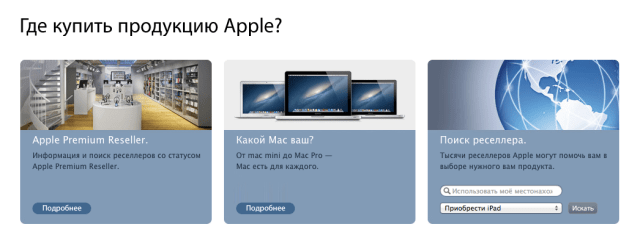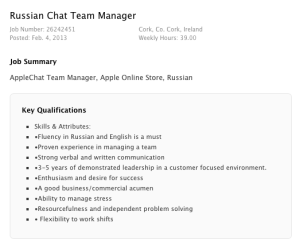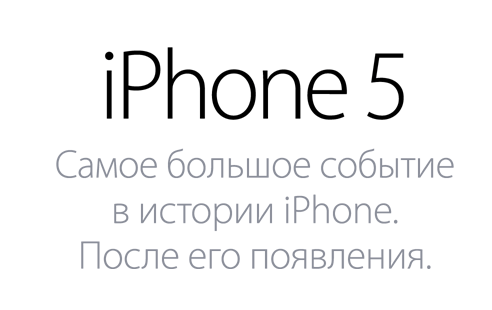Apple appears to be inching closer to opening an online store in Russia to manage direct sales to customers, adding one more store to its growing portfolio of localized operations: the company has posted a job ad for a Russian Chat Team Manager, specifically for an Apple Online Store in Russia.
Currently, Apple only sells products like the iPhone, iPad and its line of Mac computers in Russia via third-party resellers, which can be mobile carriers or other retailers. When you click on the ‘buy’ button on the current Apple site in Russian, you get this:

Based in Cork, Ireland, the chat team manager would oversee between 12 and 15 “advisors” who would help with online customer care. Specifically:
“The Apple Chat Manager will lead a team of 12/15 dynamic advisors. This will include coaching advisors to meet or exceed business goals ensuring that all Apple customers are receiving an excellent service. You will need to hire and retain a diverse and customer orientated team to strengthen the Apple Brand.”
The job ad for the chat manager was posted just yesterday afternoon. Other Russian jobs posted yesterday include one for a marketing manager for Russia, CIS and Turkey; a label relations executive for the region. Both of these are based in Moscow. Apple is also hiring for another Russian position in Ireland, for a Russian Service Provider Support Advisor, as well as several other positions based in Russia, all posted in the last week.

Of these, it looks like the chat manager is the only one so far that specifically refers to the online store — although others such as those for carrier relations would be an important component, too, since Apple resells phone contracts as an option for buyers when they purchase iPhone devices online.
An Apple spokesperson declined to comment on the job ads, or Apple’s plans in Russia.
Gradually, Apple has been building out its presence in emerging markets — a key target for handset makers who see smartphone growth slowing down in more penetrated places like the U.S. and Western Europe.
In January, the company received approval to establish both a physical Apple Store as well as an online store in Indonesia, where it will invest between $2 million and $3 million to build out its retail operations. In Russia, Apple debuted an iTunes store in December 2012, as part of a wider strategy to create more localized experiences for iOS device owners in 56 markets.
Establishing local physical and online retail stores in emerging markets like Russia would be an essential part of a wider Apple strategy to ramp up business in these countries.
International, as a whole, is already bigger than Apple’s domestic (U.S.) sales. In the last quarter, international made up 61% of Apple’s total revenues of $54.5 billion. While Apple doesn’t break out revenues for specific countries outside of main regions, one country group it did break out, Greater China (China, Taiwan and Hong Kong), saw revenues skyrocket by 67%.
All the same, Apple’s advances have been nothing compared to those of Android device makers when it comes to device penetration: in Russia, Android devices, made by the likes of Samsung and many others, dominate the smartphone market.
Establishing a stronger retail and online presence could be a way for Apple to lay the groundwork for a more aggressive low-price device strategy to better compete against Android (as well as others like Nokia/Microsoft that are also keen to target these markets).
Low-cost, pared-down iPhones could help cater specifically to consumers in these regions, complementing Apple’s existing strategy of selling older models of the iPhone at lower price points.
We’ve seen a lot of reported leaks, but officially Apple has declined to comment specifically on whether it would ever make a low-cost iPhone.
However, in last month’s Q1 earnings call, CEO Tim Cook described the company’s iPod strategy, possibly as a hint of what might come next: “We have had a great track record on [selling] iPods at different price points,” he noted. And he also mentioned how offering different models of the iPad has paid off well for the company. “We could not build enough iPad minis.”
